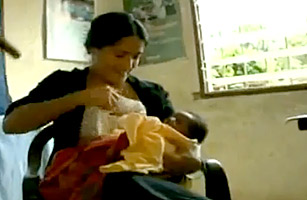
Actress Salma Hayek opened up a whole new kind of breast-feeding debate in 2009 when a video of her nursing a hungry baby boy in Sierra Leone surfaced on YouTube. Hayek told ABC's Nightline that she fed the newborn in an effort to promote breast feeding in a region that has one of the highest infant-mortality rates in the world, mainly due to malnutrition. And while HIV transmission via breast feeding is a concern throughout Africa, and international health guidelines advise HIV-positive mothers to avoid breast feeding when an alternative source of nourishment is "acceptable, feasible, affordable, sustainable and safe," those conditions aren't often met in places like Sierra Leone where starvation is an immediate threat.
Hayek won praise for her mission, and the video prompted a wave of discussion over whether Western countries should be donating breast milk to nations in need instead of, or in addition to, infant formula. There are several nonprofits that allow women to contribute milk, which is then screened for HIV and other diseases. But when it comes to getting milk to countries in crisis, like Haiti, there can be logistical barriers from lack of refrigeration to problems in transporting the milk safely.